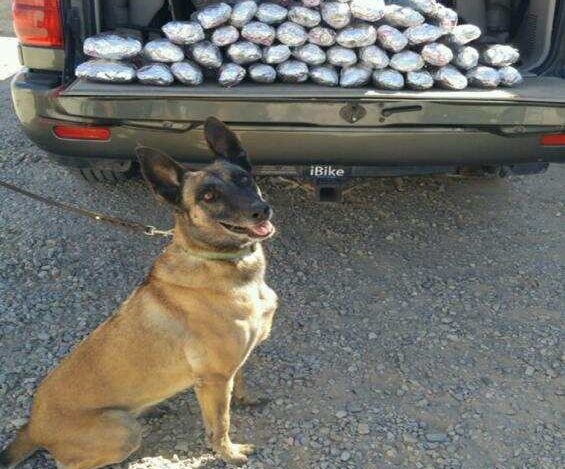Drug smugglers and traffickers are no doubt breathing a sigh of relief in El Centro, California with the news that one of the Border Patrol’s most successful officers is retiring on November 30.
Pecky, an 11-year old Belgian Malinois with the U.S. Customs and Border Patrol’s Canine Program has been a key part of the Border Patrol’s El Centro area for the past 10 years and has been extremely productive at removing drugs from the streets.
Pecky has been responsible for the removal of 2.5 tons of illegal drugs from our streets. The combined haul was worth a street value of $27 million dollars. The Border Patrol released a statement thanking her for her service and dedication. “Her drive and ability to perform at a high level for many years is appreciated by so many in the El Centro Sector,” it said.
“These service dogs are invaluable to the agency,” El Centro Sector’s Acting Chief Patrol Agent Ryan J. Scudder said. “I can’t express enough how proud we are of our K-9 department.”
The training for the K9 program begins at birth and the dogs are specially selected for this type of work. The selection assessment and training program is as discriminating as in Special Operations Forces. The program takes about 7 months for dogs to complete and costs around $40,000 for each K9 that is chosen. So, Pecky’s return on investment was an absolute bargain for the CBP.
Pecky began her tour of duty with CBP (Customs and Border Patrol) in 2009 and in her 10-year career, she was involved in countless drug raids and seizures that led to the confiscation of:
- 1,823 pounds of marijuana
- 578 pounds of cocaine
- 1,403 pounds of methamphetamine
- 1,018 pounds of heroin
The CBP Canine Program is headquartered in El Paso, Texas and oversees two training delivery sites, Canine Center El Paso (CCEP) in El Paso, Texas and Canine Center Front Royal (CCFR) in Front Royal, Virginia.
The primary goal of the CBP Canine Program is terrorist detection and apprehension. The working CBP canine team has become the best tool available in detecting and apprehending persons that attempt entry with the purposes of organizing, inciting and carrying out acts of terrorism. The Canine Program’s secondary goal is detection and seizure of controlled substances and other contraband that is often used to finance terrorist and/or criminal drug trafficking organizations. Additionally, CBP canine teams assist local law enforcement agencies when requested.
Most of the dogs in the Border Patrol are German shepherds and Belgian Malinois. Since most are purchased through German or Belgian breeders, the dogs take commands in those countries’ respective languages.
Humans shed off 40,000 skin cells from their bodies every minute. Tracking and trailing dogs not only sense the skin cells but can detect other odors the person may exude, such as shampoo or deodorant. With a sense of smell 40 times greater than a human’s, the dogs are trained to detect and identify both explosive material and hostile or hiding humans. The dogs are twice as fast as a fit human, so anyone trying to escape is not likely to outrun them.
Recent news have been chockfull of courageous K-9 “Conan,” who was wounded in the Delta Force raid that killed ISIS leader Abu Bakr al-Baghdadi. It was a few years ago when the Navy SEALs raided Osama bin Laden’s compound in Pakistan and kille the leader of al-Qaeda: The SEALs went into that operation with a K-9 named “Cairo.”
Already have an account? Sign In
Two ways to continue to read this article.
Subscribe
$1.99
every 4 weeks
- Unlimited access to all articles
- Support independent journalism
- Ad-free reading experience
Subscribe Now
Recurring Monthly. Cancel Anytime.
Since the time of the ancient Greeks and Romans, dogs have been a valued and trusted member of the military. The Romans used a breed of Mastiff that is now extinct. Then, they covered their canines in armor with spiked collars and used them to wreak havoc on their enemies. The U.S. military and police have always used dogs and many were used in World War II and Vietnam.
Perhaps the first well-known military dog was SGT Stubby that was a stray Bull Terrier that was adopted by the 102nd Infantry Regiment of the 26th Infantry Division (The Yankee Division). Stubby met three U.S. Presidents, marched in numerous parades and even received a half-page obituary in the New York Times when he died in 1926.
So, when the agents of the El Centro office met to bid farewell to Pecky on her retirement, they said they hoped it was “full of sandy beaches.” She’s earned it. Hopefully, her retirement will be one of comfort and ease: she served her time faithfully and has now joined the list of K-9 heroes who have served our country well.










COMMENTS